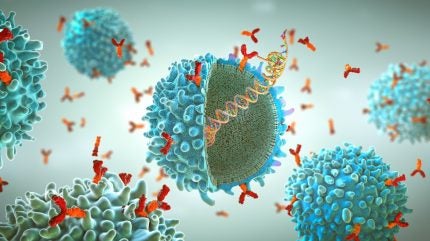

Oxford-based cell therapy company Adaptimmune Therapeutics has received accelerated approval from the US Food and Drug Administration (FDA) for Tecelra (afamitresgene autoleucel) for treatment of synovial sarcoma.
Tecelra is the first engineered cell therapy for solid tumours approved in the US, and represents the first therapy option against synovial sarcoma in more than a decade. It is indicated to treat adults with unresectable or metastatic synovial sarcoma who have received prior chemotherapy, and whose tumours express the MAGE-A4 antigen. Additionally, the tumours need to have a certain HLA type— HLA-A*02:01P, -A*02:02P, -A*02:03P, or -A*02:06P positive.
The approval was granted based on results from the Phase II SPEARHEAD-1 trial (NCT04044768). Amongst 44 patients with synovial sarcoma, the overall response rate (ORR) to treatment was 43% with a median duration of response of six months (95% CI: 4.6, not reached). Continued approval remains subject to verification of clinical benefit in further trials.
Synovial sarcoma is a rare, soft tissue cancer with a five-year survival rate of around 36%, which drops to 20% with metastatic disease. It largely effects young adults, with a third of diagnoses occurring in patients under the age of 30. Brandi Felser, CEO of the Sarcoma Foundation of America, described the recent development as, “a renewed sense of hope for this patient community.”
The FDA approval follows a series of partnerships made by Adaptimmune. In 2021 the company collaborated with Genentech, a division of Roche, to develop T cell therapies in a five-year deal which could see Adaptimmune receive over $3bn. The company has further partnered with Agilent Technologies to develop the MAGE-A4 ICH 1F9 pharmDx companion diagnostic, which also received FDA approval today (2 August), as well as with Thermo Fisher Scientific to include Tecelra in the labelling for their SeCore CDx HLA-A Locus Sequencing System.
As per GlobalData analysis, afamitresgene autoleucel treatment for synovial sarcoma is projected to generate $9mn in revenue for Adaptimmune this year. This is set to reach $97mn by 2030.
Access the most comprehensive Company Profiles on the market, powered by GlobalData. Save hours of research. Gain competitive edge.

Your download email will arrive shortly
We are confident about the unique quality of our Company Profiles. However, we want you to make the most beneficial decision for your business, so we offer a free sample that you can download by submitting the below form
By GlobalData
GlobalData is the parent company of Pharmaceutical Technology.
Adaptimmune states that it is now ready to take Tecelra orders and that its integrated AdaptimmuneAssist programme is available to support personalised treatment. The company plans to have at least six treatment centres running this year, increasing to 30 centres within two years.
In the 2 August press release announcing the approval, Adrian Rawcliffe, Adaptimmune CEO also outlined the company’s plans for other therapies. He said Adaptimmune plans, “to progress lete-cel, the next late-stage investigational treatment in our sarcoma franchise, with a rolling BLA submission to the FDA next year.”
Cell & Gene Therapy coverage on Pharmaceutical Technology is supported by Cytiva.
Editorial content is independently produced and follows the highest standards of journalistic integrity. Topic sponsors are not involved in the creation of editorial content.

Sign up for our daily news round-up!
Give your business an edge with our leading industry insights.
